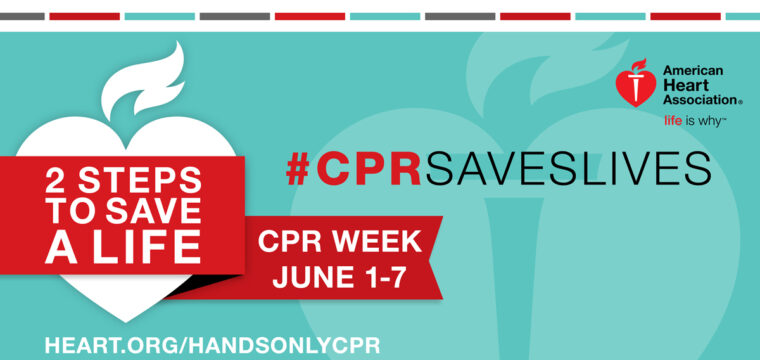National CPR & AED Awareness Week is June 1 – 7, 2016
More than 320,000 people in the U.S. experience out-of-hospital cardiac arrest each year. Statistics prove that if more people knew CPR, more lives would be saved.
National CPR and AED Awareness Week was created through a collaborative effort between the American Red Cross and the National Safety Council. The goal is to spotlight how lives can be saved if more Americans know CPR and how to use an AED (Automated External Defibrillator).
During this week each year, CPR/AED classes and demonstrations are conducted, events are hosted and educational information is distributed on the importance of being trained in CPR and AED use. Individuals are encouraged to find out about local events in your area and get trained in CPR and AED use.
Why Learn CPR?
- Sudden cardiac arrest can happen to anyone at any time, regardless of age, sex or apparent level of fitness.
- Many sudden cardiac arrest victims appear healthy, with no known heart disease or risk factors associated with heart disease.
- Of the 320,000 out-of-hospital sudden cardiac arrests annually, 88 percent occur at home.
- More than 92 percent of people who suffer cardiac arrest outside the hospital will die from it.
- Effective bystander CPR provided immediately after sudden cardiac arrest can double or triple a victim’s chances of surviving, yet less than 1/3 of all cardiac arrest victims receive bystander CPR.
- In cities where defibrillation is provided within five to seven minutes after sudden cardiac arrest, the survival rate is as high as 49 percent.
What to Do
If you see an unresponsive adult who is not breathing or not breathing normally, immediately call 911, get (or ask someone to get) an AED and begin to push hard and fast on the center of the chest. Studies now show that chest compressions are the most vital element to CPR. Remember, your actions can only help.
Become CPR & AED Trained
There are a variety of organizations that offer adult and pediatric CPR and AED training either in the classroom, online, or in a blended format.
American Red Cross of Eastern Missouri
American Heart Association – Greater St. Louis Chapter
Most universities, colleges and community colleges offer courses through their continuing education platform.








